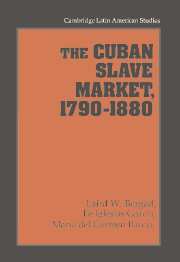Book contents
- Frontmatter
- Contents
- Tables and figures
- Preface and acknowledgments
- Glossary
- 1 Introduction: Prices and the historiography of slavery
- 2 Sources and methods of data collection
- 3 The development of African slavery and Cuban economic history
- 4 The price structure of the Cuban slave market, 1790–1880
- 5 Regional variations in the Cuban slave market: Havana, Santiago, and Cienfuegos
- 6 Coartación and letters of freedom
- 7 Conclusions and comparative perspectives
- Appendix A Nominal and real slave prices using international price indexes
- Appendix B Statistical data base on the Cuban slave market
- Bibliography
- Index
- CAMBRIDGE LATIN AMERICAN STUDIES
Preface and acknowledgments
Published online by Cambridge University Press: 22 March 2010
- Frontmatter
- Contents
- Tables and figures
- Preface and acknowledgments
- Glossary
- 1 Introduction: Prices and the historiography of slavery
- 2 Sources and methods of data collection
- 3 The development of African slavery and Cuban economic history
- 4 The price structure of the Cuban slave market, 1790–1880
- 5 Regional variations in the Cuban slave market: Havana, Santiago, and Cienfuegos
- 6 Coartación and letters of freedom
- 7 Conclusions and comparative perspectives
- Appendix A Nominal and real slave prices using international price indexes
- Appendix B Statistical data base on the Cuban slave market
- Bibliography
- Index
- CAMBRIDGE LATIN AMERICAN STUDIES
Summary
Archival research can be an exasperating and often daunting task simply because of the enormous volume of material available for consultation. On any topic, for any period, the possibility of examining all extant documents is limited by time, stamina, patience, funding, the volume of dust and debris, personal pressures, and a variety of other factors well-known to researchers everywhere. Authors of even the most lengthy and detailed books often remark on the vast documentation known to exist but which is not consulted because of such limitations.
The project leading to this book began with a fantasy shared, we are certain, by many colleagues. It begins something like this: “If I only had a research team under my supervision …” The reader can customize the rest of this sentence to fit his or her version of its conclusion.
During research breaks on many hot tropical summer afternoons between 1982 and 1987, Fe Iglesias García and Laird W. Bergad often sat in the lobby of the Archivo Nacional de Cuba in Havana. Both historians were working on long-term projects concerning various aspects of nineteenthcentury Cuban socioeconomic history, and their individual research inevitably involved Cuba's principal institution during the epoch – African slavery.
The volume of documentation in the Archivo Nacional on slavery, the slave trade, and abolition is remarkable for its quality and quantity. A large portion is situated in collections which offer no hint as to precise contents, some of it is topically catalogued, but the greatest share of materials is uncatalogued.
- Type
- Chapter
- Information
- The Cuban Slave Market, 1790–1880 , pp. xiii - xviPublisher: Cambridge University PressPrint publication year: 1995



